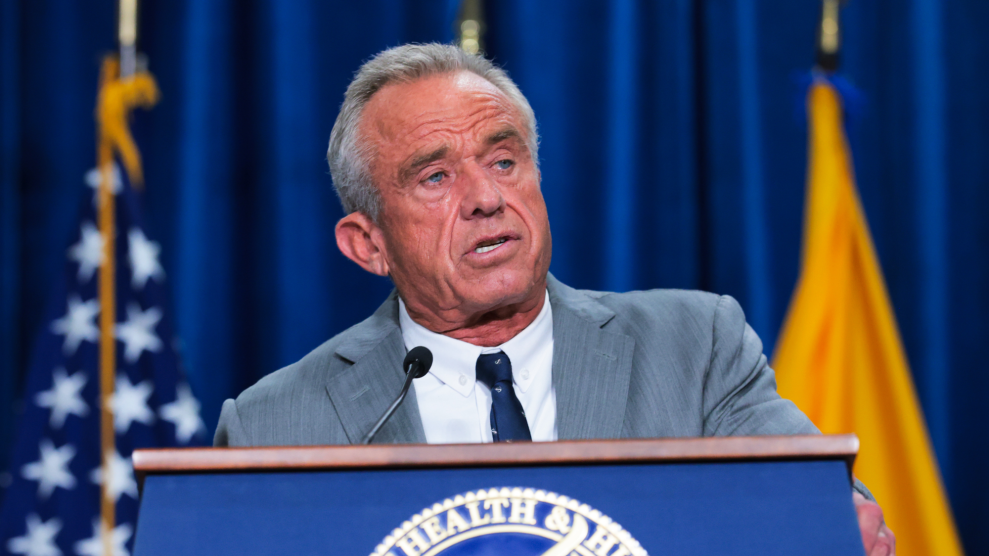Last winter, while El Niño-driven rains seemed to wash half the Americas into the Pacific, a drought on the other side of the ocean, in Borneo, the world’s third-largest island, sent more than 700 wildfires burning out of control. From January to early May, flames in the province of East Kalimantan devoured agricultural fields, destroyed primary forests, gutted parts of two national parks, and sent at least 2,000 people to hospitals with smoke-induced respiratory problems.
The fires have been widely blamed on the slash-and-burn methods farmers use to clear land. However, the East Kalimantan police, Bapedal (Indonesia’s environmental protection agency), and the Indonesian Center for Environmental Law (ICEL) have—until recently—been investigating claims that the fires were the result of arson paid for by at least nine Indonesian timber and agricultural companies. The companies, which include those possibly involved in fires that burned from September to November 1997 (see the MoJo Wire), are interested in clearing for agricultural use vast areas of land that are currently worthless due to rapid logging.
Mother Jones has obtained new evidence of corporate activity: a copy of a contract between Perkebunan GPI Pertama, a palm oil producer, and C.V. Alam Lestari, a contractor hired to clear approximately 1,000 hectares (2,470 acres) of land for palm plantations, that calls for the contractor to carry out “felling, uprooting, stacking, and burning as directed by the Management.”
The contract further stipulates that the contractor should “re-burn to achieve a complete burn to the satisfaction of the Management.”
Such contracts call into question the usefulness of foreign aid—$3.9 million has been spent so far by the U.S. Department of Defense alone—as fires were reset after international efforts had helped put them out.
All told, the 1997 and 1998 fires burned a total of 6 million acres across Indonesia, according to the World Wildlife Fund. The fires also caused a choking haze that darkened skies as far north as the Philippines; sent people in Malaysia, Indonesia, and Singapore to hospitals; and cost an estimated $1.4 billion in lost tourism revenue, work stoppages, and unexpected medical expenses.
Concern over the possibility of more haze brought international fire-fighting teams from, among others, Malaysia, Canada, Germany, and the United States. But much of that assistance, including three DOD C-130 Hercules planes and crews sent in to drop water and fire retardant, appears to have been ineffective.
Says Bill Allred, a U.S. Forest Service pilot who assisted with water drops over Indonesia late last year, “[The Indonesians] didn’t have the capability to put the fire out. They didn’t have enough crews on the ground.”
“Fire crews would go into an area and put out the fire, then come back four days later and find it burning again, and a guy standing there with a petrol can,” adds Neil Byron of the Center for International Forestry Research in Bogor, a suburb of Jakarta.
Environmentalists and timber experts in Indonesia say the government is also to blame for the fires. While in the Western imagination Borneo is a place of pristine rainforests and indigenous tribes, in truth it is fast becoming the tropical equivalent of Iowa. A government program put in place by the recently deposed President Suharto (who also maintained tight connections with timber owners) sponsors the conversion of 12.5 million acres annually into farmland for palm oil, rubber, pulpwood, and rice crops cultivation.
“There’s planning to establish many, many millions of hectares of wood-pulp plantations in East Kalimantan,” says Ludwig Schindler, an environmental engineer with the Integrated Forest Fire Management Project based in Samarinda. “The use of fire is officially forbidden, but every [timber] company uses fire, because this is the only viable and economic method of reducing huge amounts of biomass.”
The investigations by East Kalimantan police on behalf of Bapedal abruptly stopped in May, without apparent reason, immediately prior to a report the police were scheduled to give to the environmental agency. “We don’t know why they stopped the investigations,” says Sukma Sani, head of research at ICEL.
Whether those investigations will continue remains in doubt following the late-May ousting of Suharto. New Indonesian president B.J. Habibie has promised an investigation of Suharto-era corruption. But with the country still crippled by economic collapse and political uncertainty, resuming the official investigation into the fires may be at the bottom of the new government’s list. And with incentives to clear land still in place, the next Borneo fire may be only as far away as the next dry year.
















